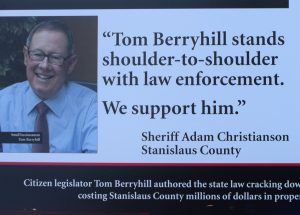
A current candidate for Stanislaus County Supervisor in District 4, Tom Berryhill was fined $40,000 in 2014 by the Fair Political Practices Commission (FPPC). Was this a technical violation of complex campaign law? Did Mr. Berryhill admit the violation? Was he repentant?
The answer to all three questions appears to be, “No.”
Why look at this “historical” event, stemming from activity in 2008? Well, while the fine was widely reported, the details of the scheme were not. After all, when he was in the Assembly and later when in the Senate, Mr. Berryhill’s districts did not include Modesto proper. His testimony was not discussed in news articles of the time.
The testimony he gave may reflect on his character. You decide. After all, it may affect how you vote if you live in the Stanislaus County’s District Four, which is primarily Modesto and north into Del Rio.
The primary source for this piece is a 46-page, single-spaced, “Proposed Decision,” written by an Administrative Law Judge who took testimony, reviewed documents and heard arguments. You can view it here.
In 2008, Mr. Berryhill was the incumbent running to maintain his seat in the 25th District. His brother, Bill Berryhill, was running for the 26th Assembly District. It was his first run for that seat. (For clarity’s sake, we will hereafter refer to the brothers by their first names)
Tom’s seat was safe, but Bill faced a well-financed Democratic opponent. His race was rated a toss-up. What was needed, according to Bill’s advisor, was a last-minute television “ad buy” to attack the Democrat.
Tom was a major fund raiser for the Republicans but had already maxed out his allowed contribution to his brother’s campaign.
The funds:
On October 28, 2008, Tom held a fund raiser. It was advertised as an event to benefit his campaign. The event coordinator testified that all checks received were made out to Tom’s committee. A total of about $50,000 was raised, net, after costs. The funds were deposited into Tom’s account.
On October 29 there was a flurry of emails amongst and between officials of the Berryhill campaigns and the Stanislaus and San Joaquin Republican Central Committees.
The following day, Gary McKinsey, treasurer of the Stanislaus County Republican Central Committee, deposited Tom’s check for $20,000 in the Stanislaus committee’s account. He then met an operative of Bill’s campaign on the sidewalk not far from the bank where he handed over a $20,000 check from the Stanislaus committee to Bill’s campaign.
That same day, a bank-to-bank wire transfer for the same amount was made from Tom’s account to the San Joaquin County Republican Central Committee’s account. The San Joaquin committee then passed the funds to Bill’s account.
Neither Bill nor his campaign time filed receipt of the contributions through the Republican central committees. Ultimately, Bill launched an $87,000 television ad campaign. He won the seat, which he held until 2012.
The evidence:
The rules were clear. Tom had already given the maximum of $3,600 to his brother’s campaign. He could not contribute more without violating campaign regulations. Whether called “laundering” or “earmarking,” Tom could not funnel money through a third person or entity to Bill’s campaign.
The committees and Tom took the position that both committees had exercised independent assessments of the needs of Republican candidates and made their contributions on that basis. Tom testified that he did not earmark the funds to Bill’s election efforts but, “hoped and prayed,” that his donated funds would be used wisely. The quotation marks around the words “hoped and prayed” were in the decision.
The judge did not accept that reasoning. He found that the violations were “serious and deliberate” and were made with the intent to, “conceal, deceive or mislead.” His “Proposed Decision,” with minor technical changes, was accepted unanimously by the full commission, composed of two Democrats and two Republicans.
The chief enforcer for the FPPC called the scheme, “cheating on the election, plain and simple.” Ultimately, Tom Berryhill decided not to appeal and paid the $40,000 fine, as well as $56,000 in attorneys’ fees and other expenses.
The takeaway:
Mistakes are made. People ‘fess up and apologize. Or, they don’t, and may be viewed differently. We have provided the decision which includes the testimony the judge relied on. Will your view match his?
Coming soon: Can anyone say “no” to the sheriff? The current sheriff has a well-equipped army (with armored vehicles), a navy (patrol boats and jet skis) and an air force (two airplanes, two helicopters and nine drones). His SWAT team just got back from combat training maneuvers in Jordan (the Jordan in the Middle East, not Utah). What will the next sheriff ask for, and get? There are two seats up for grabs, Districts 3 and 4 this year. The supervisors have budgetary control over the sheriff, or should.
Former Modesto Bee reporter and retired attorney Steve Ringhoff combines his passions for journalism and law in series of investigative reports about Modesto and surrounding areas. Read more of his work HERE.

[…] Steve Ringhoff’s excellent report about Tom Berryhill’s violations of rules required by the Fair Political Practices Commission is a cogent reminder of the casual corruption that runs rampant in today’s politics. In 2014, Berryhill paid a $40,000 fine for what amounted to a money-laundering scheme for campaign funds illegally provided by his brother. […]